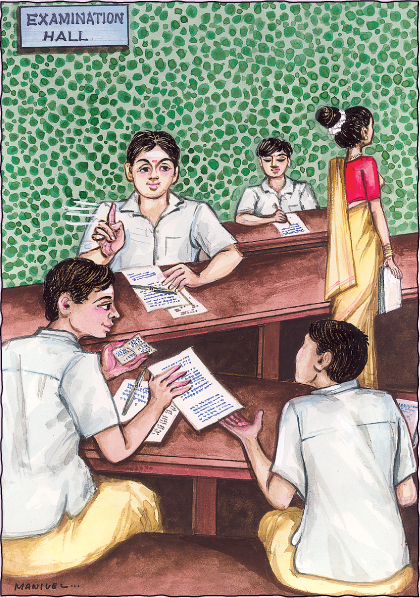THE SEVENTH RESTRAINT
Compassion
Dayā दया
 AYĀ, COMPASSION, IS THE SEVENTH YAMA. SOMETIMES IT IS KIND TO BE CRUEL, AND AT OTHER TIMES IT IS CRUEL TO BE KIND. THIS STATEMENT HAS COME FORWARD FROM religion to religion, generation to generation. Compassion tempers all decisions, gives clemency, absolution, forgiveness as a boon even for the most heinous misdeeds. This is a quality built on steadfastness. Dayā comes from deep sādhana, prolonged santosha, contentment, scriptural study and listening to the wise. It is the outgrowth of the unfolded soul, the maturing of higher consciousness. A compassionate person transcends even forgiveness by caring for the suffering of the person he has forgiven. The compassionate person is like a God. He is the boon-giver. Boons, which are gifts from the Gods, come unexpectedly, unasked-for. And so it is with the grace of a compassionate person.§
AYĀ, COMPASSION, IS THE SEVENTH YAMA. SOMETIMES IT IS KIND TO BE CRUEL, AND AT OTHER TIMES IT IS CRUEL TO BE KIND. THIS STATEMENT HAS COME FORWARD FROM religion to religion, generation to generation. Compassion tempers all decisions, gives clemency, absolution, forgiveness as a boon even for the most heinous misdeeds. This is a quality built on steadfastness. Dayā comes from deep sādhana, prolonged santosha, contentment, scriptural study and listening to the wise. It is the outgrowth of the unfolded soul, the maturing of higher consciousness. A compassionate person transcends even forgiveness by caring for the suffering of the person he has forgiven. The compassionate person is like a God. He is the boon-giver. Boons, which are gifts from the Gods, come unexpectedly, unasked-for. And so it is with the grace of a compassionate person.§
A devotee asked, “What should we think about those who are cruel toward creatures, who casually kill flies and step on cockroaches?” Compassion is defined as conquering callous, cruel and insensitive feelings toward all beings. A compassionate person would tell a plant verbally if he was going to pick from it, intuiting that the plant has feelings of its own. A compassionate person would seek to keep pests away rather than killing them. A callous person would tear the plant up by its roots. A cruel person would, as a child, pull one wing off a fly and, unless corrected, mature this cruelty on through life until he maimed a fellow human. Compassion is just the opposite to all this.§
When we find callous, cruel and insensitive people in our midst, we should not take them into our inner circles, but make them feel they must improve before admittance onto the spiritual path. Compassion is the outgrowth of being forgiving. It is the outgrowth of truthfulness, and of noninjury. It is a product of asteya, of brahmacharya and of kshamā. It is, in fact, higher consciousness, based in the viśuddha chakra of divine love.§
One can’t command compassion. Before compassion comes love. Compassion is the outgrowth of love. Love is the outgrowth of understanding. Understanding is the outgrowth of reason. One must have sufficient memory to remember the various points of reason and enough willpower to follow them through to be able to psychically look into the core of existence to gain the reverence for all life, all living organisms, animate or inanimate. Compassion is a very advanced spiritual quality. When you see it exhibited in someone, you know he is very advanced spiritually—probably an old soul. It really can’t be taught. Dayā goes with ānanda. Compassion and bliss are a one big package.§
What is the difference between ahiṁsā and dayā, compassion, one might ask? There is a distinct difference. Not harming others by thought, word or deed is a cardinal law of Hinduism and cannot be avoided, discarded, ignored or replaced by the more subtle concept of compassion. Ahiṁsā, among the yamas and niyamas, could be considered the only explicit commandment Hinduism gives. Compassion comes from the heart, comes spontaneously. It is a total flow of spiritual, material, intellectual giving, coming unbidden to the receiver.§
Compassion by no means is foolishness or pretense. It is an overflowing of soulfulness. It is an outpouring of spiritual energy that comes through the person despite his thoughts or his personal feelings or his reason or good judgment. The person experiencing compassion is often turned around emotionally and mentally as he is giving this clemency, this boon of absolution, despite his own instinctive or intellectual inclinations. This is a spiritual outpouring through a person. Rishi Tirumular used the word arul for this yama. Arul means grace in the ancient Tamil language.§
A devotee once e-mailed me, saying, “Recently I was going through some suffering and had bad thoughts and bad feelings for those who caused that suffering. Now that I’m feeling better, can I erase those bad thoughts and feelings?” Thoughts and bad feelings you have sent into the future are bound to come back to you. But, yes, you can mitigate and change that karma by being extra-special nice to those who abused you, hurt you or caused you to have bad thoughts and feelings against them. Being extra-special nice means accepting them for who they are. Don’t have critical thoughts or try to change them. Have compassion. They are who they are, and only they can change themselves. Be extra-special nice. Go out of your way to say good words, give a gift and have good feelings toward them.§

